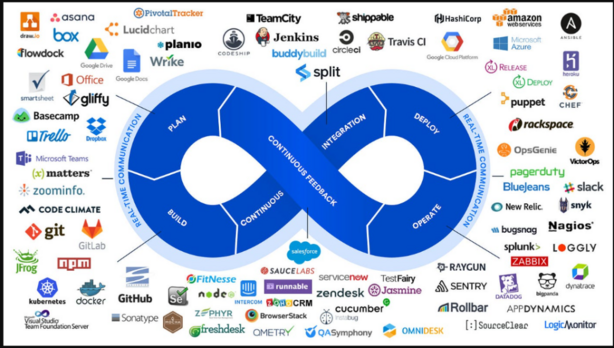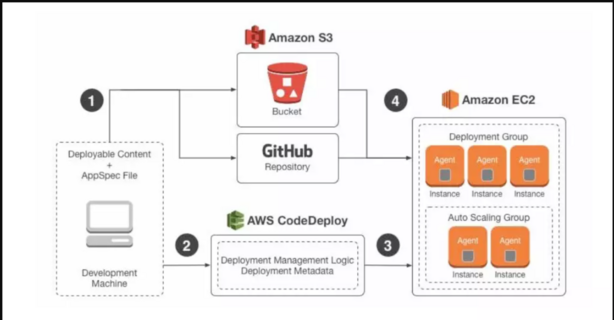Upgrade & Secure Your Future with DevOps, SRE, DevSecOps, MLOps!
We spend hours on Instagram and YouTube and waste money on coffee and fast food, but won’t spend 30 minutes a day learning skills to boost our careers.
Master in DevOps, SRE, DevSecOps & MLOps!
Learn from Guru Rajesh Kumar and double your salary in just one year.

DevOps tools are a critical component of DevOps practices, enabling automation, collaboration, and continuous integration and delivery across the software development lifecycle. These tools help streamline development, testing, deployment, and monitoring processes, reducing manual tasks, and improving system reliability and speed.
By automating tasks and integrating processes, DevOps tools allow teams to deliver software more efficiently and reliably. The ecosystem of DevOps tools is vast, covering a range of tasks from version control to continuous monitoring. This post explores some of the major categories of DevOps tools and their features, showcasing how they contribute to a successful DevOps implementation.
Key Features of DevOps Tools
DevOps tools share several key features that make them indispensable for modern software development and operations teams. These features enable teams to collaborate, automate workflows, and continuously improve software delivery.
Key Features Include:
- Automation:
- DevOps tools automate repetitive tasks, such as testing, deployment, and monitoring, allowing teams to focus on higher-value work.
- Automation improves efficiency, reduces human error, and accelerates the software development lifecycle.
- Collaboration:
- DevOps tools facilitate collaboration between development, operations, and QA teams, ensuring that all stakeholders are aligned and can work together effectively.
- By using shared platforms and integrated tools, teams can resolve issues faster and streamline workflows.
- Continuous Integration and Continuous Delivery (CI/CD):
- CI/CD tools automate the integration of new code and the delivery of software updates to production.
- This ensures that new features are delivered rapidly without compromising on quality, enabling faster release cycles.
- Scalability:
- Many DevOps tools are designed to scale with the needs of the organization, enabling teams to manage growing applications and infrastructure efficiently.
- Tools like Kubernetes and cloud platforms allow organizations to scale services on-demand based on traffic and resource requirements.
- Real-Time Monitoring and Feedback:
- DevOps tools provide real-time monitoring of applications and infrastructure, helping teams identify issues as soon as they arise.
- Feedback loops from monitoring tools help teams continuously improve service reliability and performance.
Categories of DevOps Tools
The DevOps ecosystem includes a wide variety of tools that serve different functions across the development lifecycle. These tools help automate tasks, manage code, ensure quality, and provide visibility into application performance.
Key Categories Include:
- Version Control Tools:
- Version control tools are essential for managing and tracking changes in code over time. They enable multiple developers to collaborate on a project without overwriting each other’s work.
- Popular version control tools include Git, Subversion (SVN), and Mercurial.
- Track changes in source code.
- Enable collaboration between teams.
- Ensure code consistency and integrity.
- Continuous Integration/Continuous Delivery (CI/CD) Tools:
- CI/CD tools automate the process of integrating code changes and deploying them to production. These tools enable teams to deliver updates more frequently, with improved quality and consistency.
- Popular CI/CD tools include Jenkins, GitLab CI, Travis CI, and CircleCI.
- Automate build, test, and deployment pipelines.
- Enable faster software delivery with reduced manual intervention.
- Integrate with version control systems to trigger automatic builds and deployments.
- Configuration Management Tools:
- Configuration management tools ensure that systems are configured consistently across different environments, helping teams manage infrastructure and services.
- Popular configuration management tools include Ansible, Chef, Puppet, and SaltStack.
- Automate infrastructure provisioning and management.
- Ensure consistency across environments (dev, test, prod).
- Reduce the risk of configuration drift and system misconfigurations.
- Containerization and Orchestration Tools:
- Containerization tools enable the packaging of applications and their dependencies into portable containers, which can be deployed across different environments without compatibility issues.
- Orchestration tools like Kubernetes manage the deployment, scaling, and operation of containerized applications.
- Simplify application deployment and scaling.
- Ensure consistency across environments by encapsulating dependencies.
- Automate container management, scaling, and failover.
- Monitoring and Logging Tools:
- Monitoring and logging tools provide real-time visibility into system performance, helping teams detect issues early and respond proactively.
- Popular monitoring and logging tools include Prometheus, Grafana, Datadog, New Relic, and the ELK Stack (Elasticsearch, Logstash, Kibana).
- Provide insights into system performance and user behavior.
- Generate alerts and notifications for anomalies or failures.
- Enable detailed logging for troubleshooting and performance optimization.

Key DevOps Tools in Action
To see how DevOps tools work together, here are a few examples of how organizations use them to streamline their development pipelines and improve service delivery.
Examples Include:
- Automating the CI/CD Pipeline with Jenkins:
- Jenkins automates the process of building, testing, and deploying code in a continuous pipeline. By integrating Jenkins with version control tools like Git, developers can trigger automated builds and deployments every time new code is pushed.
- Automates build, test, and deployment processes.
- Integrates with a wide range of tools and plugins to support complex workflows.
- Provides real-time feedback on the build status and deployment results.
- Configuration Management with Ansible:
- Ansible automates infrastructure configuration and application deployment. Teams use Ansible to define infrastructure as code and ensure that servers are configured consistently.
- Declarative configuration management for infrastructure.
- Supports multi-cloud and hybrid environments.
- Reduces human error and configuration drift.
- Container Orchestration with Kubernetes:
- Kubernetes helps manage containerized applications at scale. It automates the deployment, scaling, and operation of containers, making it easier for teams to deploy and maintain applications in production.
- Automated scaling and load balancing for containerized applications.
- Self-healing capabilities, such as automatically replacing failed containers.
- Facilitates deployment and management of microservices architectures.
Choosing the Right DevOps Tools for Your Organization
Choosing the right DevOps tools for your organization can be a daunting task, especially with the variety of options available. The right tools depend on several factors, including the organization’s size, complexity of infrastructure, and specific business requirements.
Considerations Include:
- Integration with Existing Systems:
- When selecting tools, ensure that they integrate seamlessly with your current systems and workflows. For example, a CI/CD tool should integrate with your version control system and testing tools.
- Scalability and Flexibility:
- Choose tools that can scale with your organization’s growth. Tools like Kubernetes are designed to handle large-scale applications, while others, like Docker, are great for smaller deployments.
- User Experience and Support:
- Consider the user experience when selecting tools. Tools with strong community support, comprehensive documentation, and an active user base tend to be more reliable and easier to adopt.
- Security Considerations:
- Security should be a priority when selecting DevOps tools. Look for tools that integrate security testing into the CI/CD pipeline (i.e., DevSecOps) and provide features for managing secrets and compliance.
The Power of DevOps Tools
DevOps tools are essential for enabling the automation, collaboration, and continuous delivery required in modern software development. By selecting the right combination of tools, organizations can improve efficiency, reduce errors, and accelerate the software delivery process.
Whether you are just starting with DevOps or looking to refine your existing processes, understanding the tools available and their capabilities is a key step toward success. The right DevOps tools will not only streamline your development pipeline but also contribute to creating more reliable, secure, and scalable applications.

 Starting: 1st of Every Month
Starting: 1st of Every Month  +91 8409492687 |
+91 8409492687 |  Contact@DevOpsSchool.com
Contact@DevOpsSchool.com